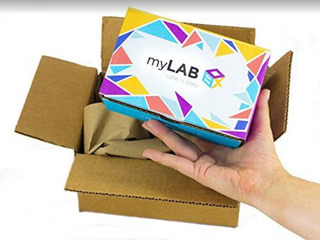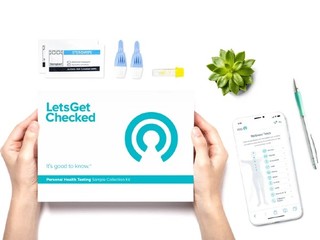
imaware buys STI consumer testing business from binx health
The deal will double imaware's B2B clients, and grow its patient count by 50%

The overall number of reported sexually transmitted diseases (STDs) has been on the rise since 2014, with infections disproportionately affecting young people under the age of 25, racial and ethnic minority groups, and gay or bisexual men. The pandemic made the problem even worse: there were 2.5 million STD cases in 2021, with chlamydia, gonorrhea, syphilis, and congenital syphilis cases combined were up over 4%.
A number of companies have come along to help make testing for STDS, including Letsgetchecked, ixLayer, and binx health, a company in the business of making testing for sexually transmitted diseases convenient, accurate and discrete.
Binx had two offerings: first, its at-home sample collection, with test processing at its central laboratory, and results delivered to the patient at home; second, its point-of-care testing through an FDA-cleared device known as the “io,” enabling testing onsite in near-patient locations with test results for chlamydia and gonorrhea delivered in about thirty minutes.
Now, though, binx health will be completely focused on its point-of-care testing product, as earlier this week it announced that its at-home business has been sold to imaware, a patient-facing platform that offers scientifically validated home-based tests that screen and monitor a wide range of conditions. No financial terms of the deal were disclosed.
The two businesses were very different, Jeff Luber, CEO of binx health, and founder of the binx health consumer division, told VatorNews, so it made sense to focus on just one.
"In our point-of-care business, as the only platform of its kind that can test for chlamydia and gonorrhea for both men and women in about 30 minutes, we are investing heavily in manufacturing and commercialization and will have four national distributors and 1,400 salespeople at our side in 2024 selling our platform and test cartridges throughout the United States," he said.
"This is a big undertaking and it just made sense to rationalize our focus and look for a partner with a great reputation and with a vision similar to ours to whom we could move our customers and help them grow. Imaware was the ideal partner for us."
Founded in 2017, the Austin-based imaware provides tests across categories that include men's health, women's health, coronavirus, allergic diseases, autoimmune diseases, and preventative genetics.
Since its creation, binx health’s consumer division has delivered millions of tests, serviced hundreds of business partners, and generated tens of millions of dollars in revenue. The company also pivoted the business to support COVID testing during the pandemic, helping to keep NYU and other schools and businesses open and students and faculty safe while others had to close, and it also did a lot of testing in public health, helping the State of Alabama Department of Public Health reach all counties in the state for access to much needed STI testing.
Patients looking to test for STIs, after completing intake surveys, are provided testing options, which are sent to their home, along with pre-paid return to lab shipping, where the sample is then processed in a CAP/CLIA lab. Results are then sent to the patient, and physician consults are setup for patients who test positive, with treatment plans made available.
"We are bringing science-backed, high quality testing to the home to improve access, convenience. Specifically STI testing, which many patients have wanted to do from home versus the doctors office, was an area we felt we could improve with home-based testing and treatments," said Jani Tuomi, co-founder of imaware.
"Binx health has established a deep pipeline of clients, especially across State Departments of Health, who are leading the charge against increasing STI rates by offering tests to communities that are experiencing outbreaks."
Going forward, imaware will be incorporating binx's technology into its platform, enabling the company to not only offer STI testing and urine-based sample processing, but connectivity to additional EMR systems and State-level reporting systems, which will speed up the ability to deploy tests and get in front of outbreaks even faster.
Tuomi believes the acquisition will help imaware grow significantly over the coming years: the company currently has over 20 B2B clients, and binx provides an almost 100% increase in client counts, while expanding its covered lives “patient count” by over 50% to over 15 million lives.
"imaware is dedicated to providing science-backed, home-based testing capabilities, in order to help patients identify illness and disease earlier, and to take action in order to live a healthier life. This acquisition sets us up with government support to reach more patients. with more testing capabilities," he said.
For binx, now that it has sold off its consumer testing business, its sole offering will be binx io, its point-of-care, sample to answer FDA-cleared, CLIA-waived device that will be sold through distribution and aimed at the 220,000 CLIA-waived sites across the United States. Its customers include OB-GYN offices, physician office labs, retail clinics, urgent care centers, emergency departments, student health centers, and sexual health clinics.
With its launch with distribution in 2024, binx expects to grow topline sales rapidly and place thousands of our instruments and sell hundreds of thousands of its test cartridges over the next several years. It also sees the opportunity to launch new tests on the same platform as it has done a lot of proof of principle work demonstrating feasibility of the platform across biological samples, including saliva, blood, stool, vaginal swab, and urine, and various diseases.
"Every year there are 35 million chlamydia and gonorrhea tests processed at central laboratory. Every one of those tests is a test for which we offer a better value proposition. Instead of a patient having to wait several days for a test result (the time it takes for a sample collected at a clinic to be sent to a laboratory for processing and for the result to come back), answers can be provided in just 30 minutes onsite while the patient is still at the doctor’s office," said Luber.
"This is important because the data today show that 40% of patients who are positive for chlamydia or gonorrhea and who leave the clinic without an answer, never come back for treatment. Rapid test and treat onsite can help solve that and, we think, create a paradigm shift in sexual health care and treatment."
Related News



